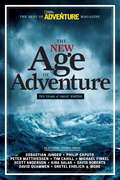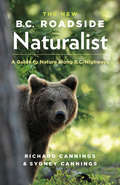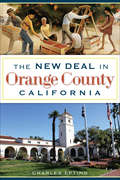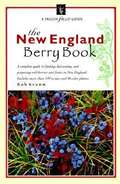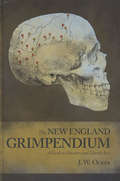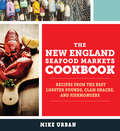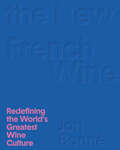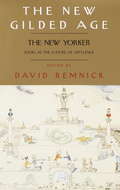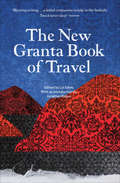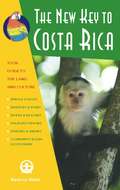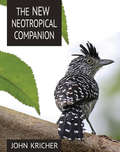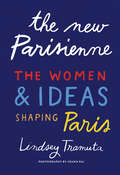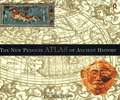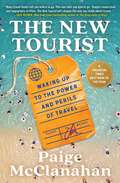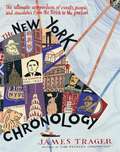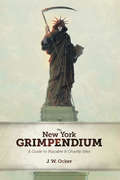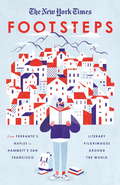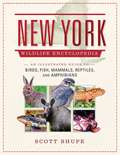- Table View
- List View
The New Age of Adventure: Ten Years of Great Writing
by John RasmusThese stories rocket readers across the roof of the world on the new high-speed railway in Tibet, describe the tension between Indian farmers and the sacred elephants besieging their villages, and introduce them to a shaman whom some believe can cure the most serious depressions.
The New B.C. Roadside Naturalist
by Richard Cannings Sydney CanningsIn this fascinating guide to the roadside ecology of the major highways in B.C., you'll discover a whole new dimension to taking a car trip. This new edition has been updated and expanded to cover northern British Columbia and southern Yukon, giving readers a unique perspective on the northern wildlife and vegetation. Southern travellers "may find that this journey will redefine what 'northern British Columbia' means to them, or even what 'north' means."Sidebars tell stories about various species, such as the huge, endangered sturgeon and the Great Basin spadefoot toad, which spends most of the year underground. Full-colour photographs and black-and-white drawings illustrate numerous plants and animals that make their homes along the roadsides of British Columbia, and maps show the route of each highway discussed. In addition, the book offers suggestions for where to stop and look for crayfish, enjoy a swim in summer, or have a picnic lunch during your travels. An appendix provides a brief field guide of tree silhouettes and hints for identifying trees and shrubs.Whether you're taking a day trip or a two-week holiday, your drive along the highways of B.C. will be enriched by the storehouse of information in this facinating and informative guide.
The New Deal in Orange County, California
by Charles EptingThis historical tour explores how FDR&’s domestic programs helped revitalize a region devastated by natural disasters and the Great Depression. While many people are familiar with the New Deal&’s sweeping initiatives, few have a nuanced sense of what this &“alphabet soup&” of organizations actually did on a local level. In this fascinating book, historian Christopher Epting looks at the various New Deal projects undertaken in Orange County, showing how they met the myriad needs of its struggling communities. Unpredictably harsh elements wreaked havoc in Orange County during the Great Depression. The Long Beach earthquake of 1933 and the 1938 Santa Ana River flood took numerous lives, decimated buildings and destroyed much of the county's namesake citrus industry. In response, Orange County received federal public aid through the Works Progress Administration, Civilian Conservation Corps and other agencies. Epting reveals their efforts in this tour of the buildings, bridges, harbors, trails, libraries, highways and other infrastructure gains—many still in use—that were revitalized by President Roosevelt&’s New Deal.
The New England Berry Book
by Bob KrummContains a guide and recipes for wild blueberries, huckleberries, blackberries, black currants, black raspberries, beach plum, chokecherries, juneberries, elderberries, red raspberries, cranberries, and strawberries.
The New England Clam Shack Cookbook, 2nd Edition
by Brooke DojnyPart travelogue, part cookbook, this colorful collection captures the unique charm of New England’s seafood cuisine. Brooke Dojny takes you on a tour of family-owned and -operated clam shacks from Connecticut to Maine and offers dozens of simple recipes for rich and buttery lobster, fried clams, creamy chowders, and much more. Whether you’re looking to plan a tasty weekend road trip up the coast or host a backyard lobster bake, you’ll find everything you need in this deliciously salty collection.
The New England Diner Cookbook: Classic and Creative Recipes from the Finest Roadside Eateries
by Mike UrbanNew England is the birthplace of the American diner, and this book brings together the best of them and shares with you their best recipes for comfort food, New England style. Celebrate the food, culture, and funky architecture of these scrappy culinary icons with recipes, color photos, interviews with owners, and heartwarming stories from a broad array of customers. Diners were born in New England (Rhode Island, to be exact), and they have a long and colorful history as local eateries of distinction because of both their menus and their buildings. Though many diners have gone by the wayside in the past half century, there are still plenty around, and each has at least a dish or two for which they're best known and that keep customers coming back year after year. The New England Diner Cookbook celebrates every facet of these diamonds in the rough. Along with diners that have perfected the tried-and-true items like corned beef hash, clam chowder, and malted milkshakes, many have developed relatively sophisticated menus that include distinctly New England delicacies like Lobster Chow Mein, Butterscotch Indian Pudding, and Portobello Mushroom Fries.
The New England Grimpendium
by J. W. OckerAn insider’s guide to wicked, weird, and wonderful New England. A rich compendium of macabre and historic New England happenings, this travelogue features firsthand accounts of almost 200 sites throughout New England. This region is full of the macabre, the grim, and the ghastly—and all of it is worth visiting, for the traveler who dares! Author J. W. Ocker supplements directions and site information with entertaining personal anecdotes. Topics include: Legends and personalities of the macabre Infamous crimes and killers Dreadful tragedies Horror movie locales Notable cemeteries and gravestones Intriguing memento mori Classic monsters
The New England Seafood Markets Cookbook: Recipes from the Best Lobster Pounds, Clam Shacks, and Fishmongers
by Mike Urban150 recipes from the best seafood markets in New England From New Haven to Bar Harbor, the New England coast is home to some of the best lobster pounds and fish markets in the world. Dedicated staff bring in the freshest catches every day, so who better to get cooking tips from? The New England Seafood Markets Cookbook features delicious recipes from all around the region, including: Cappy's Clear-Broth Clam Chowder Shackford and Gooch Salt Codfish Cakes Presidential Swordfish Smoky Monkfish and Mussels Marinara Bud's Deviled Stuffed Clams Maine's Original Lobster Roll Throughout, the recipes are supplemented with profiles of more than 30 of the top seafood markets?their histories, their owners, and their specialties?and sidebars that highlight the best of the area's seaside culinary culture.
The New French Wine: Redefining the World's Greatest Wine Culture
by Jon BonnéJAMES BEARD AWARD NOMINEE • IACP AWARD FINALIST • The first definitive guide to contemporary French wines and producers, from a two-time James Beard Award winner This comprehensive and authoritative resource takes readers on a tour through every wine region of France, featuring some 800 producers and more than 7,000 wines, plus evocative photography and maps, as well as the incisive narrative and compelling storytelling that has earned Jon Bonné accolades and legions of fans in the wine world. Built upon eight years of research, The New French Wine is a one-of-a-kind exploration of the world&’s most popular wine region. First, examine the land through a thoroughly reported narrative overview of each region—the soil and geography, the distinctive traditions and contemporary changes. Then turn to a comprehensive reference guide to the producers and their wines, similarly detailed by region. From Burgundy to Bordeaux and everywhere in between, this is sure to be the resource on modern French wine for decades to come.
The New Gilded Age: The New Yorker Looks at the Culture of Affluence
by David RemnickIn keeping with its tradition of sending writers out into America to take the pulse of our citizens and civilization, The New Yorker over the past decade has reported on the unprecedented economy and how it has changed the ways in which we live. This new anthology collects the best of these profiles, essays, and articles, which depict, in the magazine's inimitable style, the mega-, meta-, monster-wealth created in this, our new Gilded Age. Who are the barons of the new economy? Profiles of Martha Stewart by Joan Didion, Bill Gates by Ken Auletta, and Alan Greenspan by John Cassidy reveal the personal histories of our most influential citizens, people who affect our daily lives even more than we know. Who really understands the Web? Malcolm Gladwell analyzes the economics of e-commerce in "Clicks and Mortar." Profiles of two of the Internet's most respected analysts, George Gilder and Mary Meeker, expose the human factor in hot stocks, declining issues, and the instant fortunes created by an IPO. And in "The Kids in the Conference Room," Nicholas Lemann meets McKinsey & Company's business analysts, the twenty-two-year-olds hired to advise America's CEOs on the future of their business, and the economy. And what defines this new age, one that was unimaginable even five years ago? Susan Orlean hangs out with one of New York City's busiest real estate brokers ("I Want This Apartment"). A clicking stampede of Manolo Blahniks can be heard in Michael Specter's "High-Heel Heaven." Tony Horwitz visits the little inn in the little town where moguls graze ("The Inn Crowd"). Meghan Daum flees her maxed-out credit cards. Brendan Gill lunches with Brooke Astor at the Metropolitan Club. And Calvin Trillin, in his masterly "Marisa and Jeff," portrays the young and fresh faces of greed. Eras often begin gradually and end abruptly, and the people who live through extraordinary periods of history do so unaware of the unique qualities of their time. The flappers and tycoons of the 1920s thought the bootleg, and the speculation, would flow perpetually--until October 1929. The shoulder pads and the junk bonds of the 1980s came to feel normal--until October 1987. Read as a whole, The New Gilded Age portrays America, here, today, now--an epoch so exuberant and flush and in thrall of risk that forecasts of its conclusion are dismissed as Luddite brays. Yet under The New Yorker's examination, our current day is exposed as a special time in history: affluent and aggressive, prosperous and peaceful, wired and wild, and, ultimately, finite.
The New Granta Book of Travel
by Albino Ochero-OkelloA collection of travel writing by some of the genre&’s finest authors, from Paul Theroux to Sara Wheeler, voyaging from Mississippi to Malawi and Thailand. The New Granta Book of Travel Writing represents a sea change in writers&’ approaches to the craft. The 1980s were the culmination of a golden age, when writers including Bruce Chatwin, James Hamilton-Paterson and James Fenton set out to document life in largely unfamiliar territory, bringing back tales of the beautiful, the extraordinary and the unexpected. By the mid 1990s, travel writing seemed to change, as a younger generation of writers appeared in the magazine, making journeys for more complex and often personal reasons. Decca Aitkenhead reported on sex tourism in Thailand, and Wendell Steavenson moved to Iraq as a foreign correspondent. What all these pieces have in common is a sense of engagement with the places they describe, and a belief that whether we are in Birmingham or Belarus, there is always something new to be discovered.</
The New Key to Costa Rica
by Beatrice BlakeOver 400,000 copies sold of previous editions The original guide to Costa Rica, updated with even more insider hints, tips and secrets Features extensive travel information plus in-depth coverage of the natural environment and advice on how to benefit the local economy and conservation efforts Recommends and details over 50 hotels that practice sustainable tourism Written by a dedicated conservationist who lived in Costa Rica for 12 years Covers the entire country from 44 beaches on two oceans to 38 national parks, 13 volcanoes, and three cloud forests Shows how to enjoy Costa Rica's natural beauty and ecology in a socially responsible way
The New Malaysian House
by Robert Powell Albert Lim KsThe New Malaysian House is a collection of 25 contemporary houses that demonstrate a remarkable flowering of Malaysian design talent that has been germinating since the mid- 1980s. The houses range from luxury detached bungalows set in extensive tropical gardens to weekend retreats in the forest, from the gated communities springing up throughout Malaysia to extended family homes. All are distinguished by a singular quality of innovative design as the architects sought to explore new approaches for designing with the climate and in the cultural context of Malaysia.
The New Neotropical Companion
by John KricherThe New Neotropical Companion is the completely revised and expanded edition of a book that has helped thousands of people to understand the complex ecology and natural history of the most species-rich area on Earth, the American tropics. Featuring stunning color photos throughout, it is a sweeping and cutting-edge account of tropical ecology that includes not only tropical rain forests but also other ecosystems such as cloud forests, rivers, savannas, and mountains. This is the only guide to the American tropics that is all-inclusive, encompassing the entire region's ecology and the amazing relationships among species rather than focusing just on species identification.The New Neotropical Companion is a book unlike any other. Here, you will learn how to recognize distinctive ecological patterns of rain forests and other habitats and to interpret how these remarkable ecosystems function—everything is explained in clear and engaging prose free of jargon. You will also be introduced to the region's astonishing plant and animal life.Informative and entertaining, The New Neotropical Companion is a pleasurable escape for armchair naturalists, and visitors to the American tropics will want to refer to this book before, during, and after their trip.Covers all of tropical AmericaDescribes the species and habitats most likely to be observed by visitorsIncludes every major ecosystem, from lowland rain forests to the high AndesFeatures a wealth of color photos of habitats, plants, and animals
The New Paris: The People, Places & Ideas Fueling a Movement
by Lindsey Tramuta“[Tramuta] draws back the curtain on the city’s hipper, more happening side—as obsessed with coffee, creativity, and brunch as Brooklyn or Berlin.” —My Little ParisThe city long-adored for its medieval beauty, old-timey brasseries, and corner cafés has even more to offer today. In the last few years, a flood of new ideas and creative locals has infused a once-static, traditional city with a new open-minded sensibility and energy. Journalist Lindsey Tramuta offers detailed insight into the rapidly evolving worlds of food, wine, pastry, coffee, beer, fashion, and design in the delightful city of Paris. Tramuta puts the spotlight on the new trends and people that are making France’s capital a more whimsical, creative, vibrant, and curious place to explore than its classical reputation might suggest. With hundreds of striking photographs that capture this fresh, animated spirit—and a curated directory of Tramuta’s favorite places to eat, drink, stay, and shop—The New Paris shows us the storied City of Light as never before.“The author’s vibrant and precise command of English frames this lively collection of insights about cultural change and stories regarding multiple chefs and merchants.” —Forbes“As the culinary scene in Paris evolves, a new palate of flavors and styles of eating have emerged, redefining what is ‘French cuisine.’ The New Paris documents these changes through the lens of bakers, coffee roasters, ice cream makers, chefs, and even food truck owners. A thoughtful, and delicious, look at how Paris continues to delight and excite the palates of visitors and locals.” —David Lebovitz, author of My Paris Kitchen
The New Parisienne: The Women & Ideas Shaping Paris
by Lindsey Tramuta“Tramuta sweeps away the tired clichés of the Parisian woman with her vivid profiles of the dynamic and creative ‘femmes’ now powering the French capital.” —Eleanor Beardsley, NPR Paris correspondentThe New Parisienne focuses on one of the city’s most prominent features, its women. Lifting the veil on the mythologized Parisian woman—white, lithe, ever fashionable—Lindsey Tramuta demystifies this oversimplified archetype and recasts the women of Paris as they truly are, in all their complexity. Featuring 50 activists, creators, educators, visionaries, and disruptors—like Leïla Slimani, Lauren Bastide, and Mayor Anne Hidalgo—the book reveals Paris as a blossoming cultural center of feminine power. Both the featured women and Tramuta herself offer up favorite destinations and women-owned businesses, including beloved shops, artistic venues, bistros, and more. The New Parisienne showcases “Parisianness” in all its multiplicity, highlighting those who are bucking tradition, making names for themselves, and transforming the city.“With stunning photographs and inspiring profiles, Lindsey Tramuta tramples the myths and takes us into the lives of real Parisiennes. Bravo!”—Pamela Druckerman, New York Times–bestselling author of Bringing Up Bébé“Like the subjects of her book, Lindsey Tramuta is a force. The New Parisienne is the go-to chronicle of the joyful, progressive, pioneering women of a city that Tramuta understands with deep intelligence.” —Lauren Collins, New York Times–bestselling author of When in French“Tramuta’s new book posits that Parisian women have been ahead of these radically changing times. But rather than being trendsetters in the stylish sense, they qualify as visionaries and agents of change across spheres of diversity, tech, culture, politics, and more.” —Vogue
The New Penguin Atlas of Ancient History
by John Woodcock Colin McevedyThe Penguin Atlas of Ancient History illustrates in a chronological series of maps, the evolution and flux of races in Europe, the Mediterranean area and the Near East. From 50,000 B. C. to the fourth century A. D. , it is one of the most successful of the bestselling historical atlas series.
The New San Francisco at Your Feet: Best Walks in a Walker's City (3rd edition)
by Margot P. DossThis guide describes places of interest the walker may encounter during short excursions throughout the city of San Francisco, California.
The New Tourist: Waking Up to the Power and Perils of Travel
by Paige McClanahan&“A genuinely helpful framework for thinking about our own voyages&” (The Atlantic), The New Tourist explores how tourism has shaped the world, for better and for worse, and offers essential reading for anyone looking for a deeper understanding of the implications of their wanderlust.Through deep and insightful dispatches from tourist spots around the globe—from Hawaii to Saudi Arabia, Amsterdam to Angkor Wat—The New Tourist shines a light on an industry that accounts for one in ten jobs worldwide and generates nearly ten percent of global GDP. How did a once-niche activity become the world&’s most important means of contact across cultures? When does tourism destroy the soul of a city, and when does it offer a place a new lease on life? Is &“last chance tourism&” prompting a powerful change in perspective—or driving places we love further into the ground? &“Engaging and thoughtful&” (Kirkus Reviews) and filled with page-turning revelations, The New Tourist spotlights painful truths but also delivers a message of hope: that the right kind of tourism—and the right kind of tourist—can be a powerful force for good.
The New Vegan
by Aine CarlinGoing vegan can be a daunting prospect. Many familiar foods and products are out of bounds, and it can be hard to know how to enjoy a healthy, tasty diet. In her new book, top vegan author Aine Carlin guides you through the process of adopting a vegan lifestyle, with tips on what to tell people about your new diet, what you can eat at a restaurant, dealing with cravings and her take on vegan-friendly fashion (in 2015, she was named Most Stylish Vegan by PETA). There are more than 90 tempting recipes carefully tailored to people giving up meat, fish and dairy for the first time, including Jerk-marinated Cauliflower Steaks for a main course and Macadamia and Blueberry Cream Pie for dessert, and there are also delicious selections of raw and gluten-free dishes. Learn how to make your own plant milk, nut cream and even vegan-friendly beauty products. Aine's practical advice, non-judgemental approach and tempting recipes are the perfect tools as you begin your vegan journey.
The New Vegan
by Áine CarlinGoing vegan can be a daunting prospect. Many familiar foods and products are out of bounds, and it can be hard to know how to enjoy a healthy, tasty diet. In her new book, top vegan author Aine Carlin guides you through the process of adopting a vegan lifestyle, with tips on what to tell people about your new diet, what you can eat at a restaurant, dealing with cravings and her take on vegan-friendly fashion (in 2015, she was named Most Stylish Vegan by PETA). There are more than 90 tempting recipes carefully tailored to people giving up meat, fish and dairy for the first time, including Jerk-marinated Cauliflower Steaks for a main course and Macadamia and Blueberry Cream Pie for dessert, and there are also delicious selections of raw and gluten-free dishes. Learn how to make your own plant milk, nut cream and even vegan-friendly beauty products. Aine's practical advice, non-judgemental approach and tempting recipes are the perfect tools as you begin your vegan journey.
The New York Chronology: The Ultimate Compendium of Events, People, and Anecdotes from the Dutch to the Present
by James TragerFor a city like no other comes a book like no other. The New York Chronology tells the epic story of how a remote trading outpost and fishing village grew into the "world's capital" as we know it today. In tens of thousands of chronological entries, James Trager marches year by year through both the defining and incidental moments in the city's history, from the arrival of Florentine navigator Giovanni da Verrazano in 1524 to the sad closing of Ratner's Delicatessen on the Lower East Side "after 97 years of serving blintzes, kasha, latkes, and matzoh brei." With impeccable scholarship, humor, and an astonishing level of detail, Trager's information-packed entries straddle 32 separate categories that define this great metropolis. Turn to any year and you'll get a vivid sense of what life was like for New Yorkers at that time -- the political and financial developments that shaped their lives; the books, magazines, and newspapers they read; the restaurants, nightclubs, shows, and sporting events that entertained them; the fitful progress of their neighborhoods, schools, hospitals, public works, transportation systems, and so much more. Of course, New Yorkers themselves hold center stage, and The New York Chronology is loaded with eye-opening and colorful stories about its famous, infamous, and long-forgotten inhabitants. From society events and publicity stunts to scandals and murders, here are scores of offbeat tidbits that you simply won't find in a more conventional history. Handsomely illustrated with more than 130 photographs and drawings, it is an entertaining and essential book for New York lovers -- a homage as grand as the city itself.
The New York Grimpendium: A Guide to Macabre and Ghastly Sites in New York State
by J. W. OckerFrom the author of The New England Grimpendium comes a new travelogue and insider's guide to wicked, weird, wonderful New York. When J. W. Ocker's first book, The New England Grimpendium, emerged on the scene, Max Weinstein of Fangoria.com called it "a travelogue for those who revel in the glory of their nightmares." Rick Broussard at New Hampshire Magazine said of it, "I've read a dozen books about New England ghosties and weirdnesses, and this one is my favorite. It's also one of the few that actually came up with stuff I didn't already know about." Now the author of that Lowell Thomas Award winner has unearthed hundreds of similarly creepy and colorful places in the Empire State that will make your skin crawl and your hair stand on end! Ocker's essays on these places, some little known, some area landmarks, include directions and site information along with entertaining anecdotes delivered in his signature wry style. It's definitely a wild ride from a jar full of the harvested brains of dead killers to horror movie filming sites around the state; from a ships' graveyard to lake monster sightings. If it's in New York and it's bizarrely noteworthy or wonderfully wacky, you'll find it in The New York Grimpendium.
The New York Times: From Ferrante's Naples to Hammett's San Francisco, Literary Pilgrimages Around the World
by New York TimesA curated collection of the New York Times' travel column, "Footsteps," exploring iconic authors' relationships to landmarks and cities around the world Before Nick Carraway was drawn into Daisy and Gatsby’s sparkling, champagne-fueled world in The Great Gatsby, F. Scott Fitzgerald vacationed in the French Riviera, where a small green lighthouse winked at ships on the horizon. Before the nameless lovers began their illicit affair in The Lover, Marguerite Duras embarked upon her own scandalous relationship amidst the urban streets of Saigon. And before readers were terrified by a tentacled dragon-man called Cthulhu, H.P. Lovecraft was enthralled by the Industrial Trust tower-- the 26-story skyscraper that makes up the skyline of Providence, Rhode Island. Based on the popular New York Times travel column, Footsteps is an anthology of literary pilgrimages, exploring the geographic muses behind some of history's greatest writers. From the "dangerous, dirty and seductive" streets of Naples, the setting for Elena Ferrante's famous Neapolitan novels, to the "stone arches, creaky oaken doors, and riverside paths" of Oxford, the backdrop for Alice's adventures in Wonderland, Footsteps takes a fresh approach to literary tourism, appealing to readers and travel enthusiasts alike.From the Trade Paperback edition.
The New York Wildlife Encyclopedia: An Illustrated Guide to Birds, Fish, Mammals, Reptiles, and Amphibians
by Scott ShupeIn The New York Wildlife Encyclopedia, nationally known naturalist Scott Shupe has collected information on all the wildlife that reside in the Empire State. The first in a series of state wildlife encyclopedias, this book will be a handy, usable, layman’s guide to New York’s wildlife.Included are over 800 color photographs, depicting the different species of mammals, reptiles, amphibians, birds, and fish, while also offering over 600 range maps to show their territory. Along with basic information for the biology of each animal, Shupe includes the size, habitat, and abundance of each species located in the state.Whether you’re a lover of the outdoors, photography, or are looking to learn more about your state, this comprehensive guide will teach you about the wonderful wildlife that covers the water, earth, and skies of New York.
